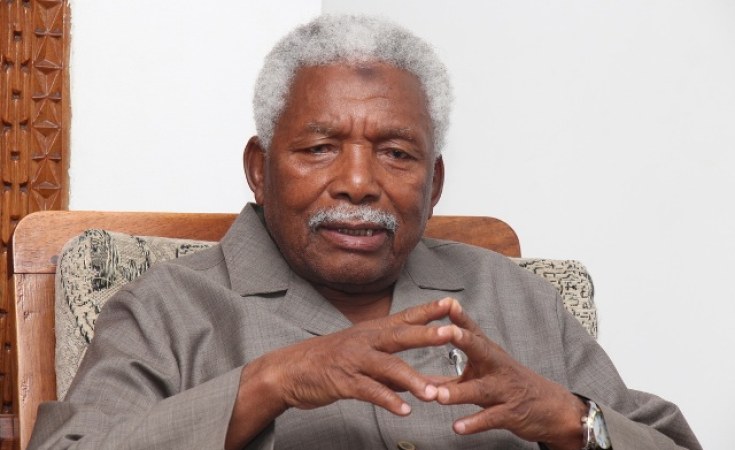Nairobi — Tanzania's second President, Ali Hassan Mwinyi, has been laid to rest at Mangapwani village in Zanzibar's Unguja Highland.
Mwinyi, who died on February 29 at the age of 98 after battling lung cancer, was buried on Saturday evening following final prayers conducted at Zinjbaar Mosque in Mazizini, Zanzibar, in accordance with Islamic traditions.
Tanzania's military honored the late Mwinyi with a 21-gun salute as a section of family members and close relatives interred his body at its final resting place.
President Samia Suluhu who presided over the state funeral proceedings at Amaan Stadium hailed Mwinyi for his pivotal role in steering Tanzania towards multi-party politics and recalibrating the country from the socialist Ujamaa policies of his predecessor, the late President Julius Nyerere, towards a more open and democratic society.
President Suluhu praised the late Mwinyi who led Tanzania between 1985 and 1995 for his pivotal role in steering Tanzania towards multi-party politics and expanding democratic freedoms.
She further lauded Mwinyi, fondly known as Mzee Rukhsa, for his pivotal role in advocating for democratic governance, earning him the moniker "the father of democracy."
Suluhu hailed Mwinyi for steering the country away from the socialist Ujamaa policies of his predecessor, the late President Julius Nyerere, towards a more open and democratic society.
"Mzee Mwinyi led Tanzania diligently after taking over the leadership role, safeguarding human rights while embracing differing viewpoints from the government of the day," Suluhu said Saturday at Zanzibar's Amaan Stadium.
She further recognized the late President for heralding a digital age and championing the independence of the media in the once-conservative country.
"He allowed independent media, including radio and television stations, to flourish without hindrance, and empowered the citizenry to keep the government in check."
'Father of democracy'
She added that the actions of Mwinyi who served as Tanzania's second president from 1985 to 1995, earned him the reputation as "the father of democracy."
Suluhu also celebrated Mwinyi for re-opening Tanzania's border, lifting restrictions of imports which allowed cross-border trade and encouraged foreign investors to invest in the country.
"For the first time private telephone companies were able to invest in Tanzania, including Mobitel," she added.
Additionally, President Suluhu credited Mwinyi for his significant contribution to the re-establishment and advancement of the East African Community, underscoring his enduring legacy in regional integration efforts.
The President attributed the reforms initiated by the late Mwinyi to the progress witnessed by successive governments in propelling Tanzania towards development.
Tanzania declared seven days of national mourning to commemorate Mwinyi's life and legacy, during which the national flag will be flown at half-mast.
Ali Hassan Mwinyi who was born in Kivure village, Pwani region, in 1925, served as Tanzania's second president succeeding President Julius Nyerere who died in October 1999.
Before assuming the presidency, he held notable positions, including Interior Minister and Vice President.
He also chaired the ruling party, Chama Cha Mapinduzi (CCM), from 1990 to 1996.
About The Author
Bruhan Makong is a dedicated journalist who reports on crime, human rights and global affairs. He is passionate about uncovering the truth, amplifying the voices often drowned in silence and holding those in power to account.


